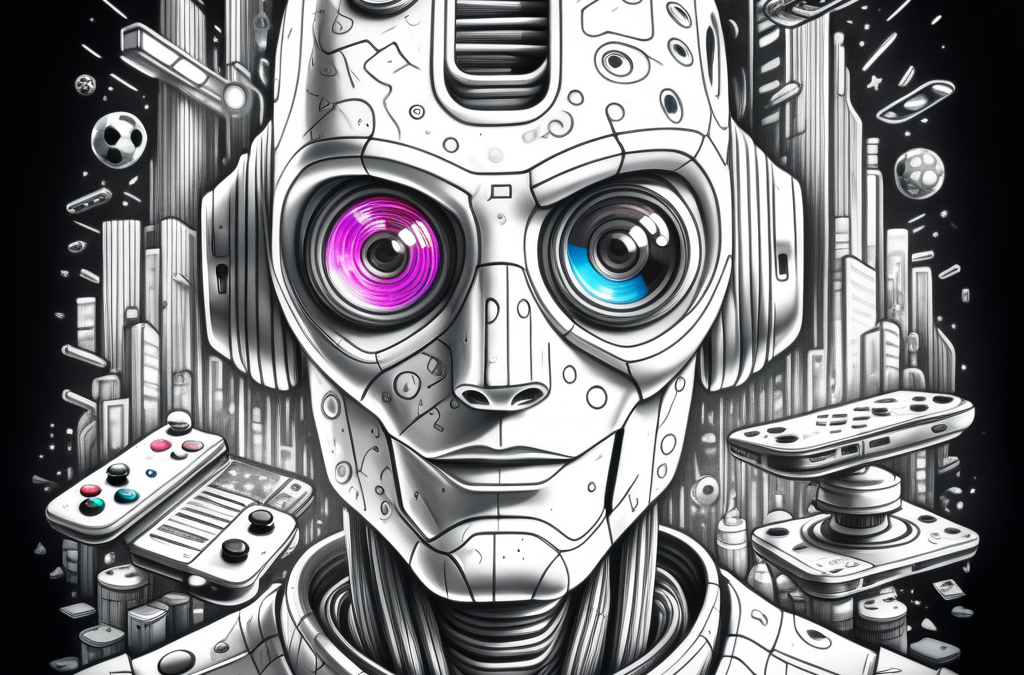Introduction: The Rise of AI in Entertainment
The entertainment industry is on the cusp of a revolution, and artificial intelligence (AI) is at the forefront of this transformation. From scriptwriting to post-production, AI’s presence is being felt at every step of the creative process. With its ability to analyze vast amounts of data, generate new ideas, and enhance the viewer experience, AI is redefining the way we create, produce, and consume entertainment. In this article, we’ll explore the impact of AI on the entertainment industry, from the film and music industries to gaming and television. Get ready to discover how AI is changing the game and what the future of entertainment has in store.
Lights, Camera, AI: Revolutionizing the Film Industry
The film industry is experiencing significant transformation, with AI leading the charge. Here are some key ways in which AI is reshaping filmmaking:
- Script Analysis: Tools like ScriptBook use machine learning to analyze screenplays and predict a movie’s potential success. This insight helps studios make informed decisions about which films to greenlight.
- Creative Collaboration: Writers can utilize AI algorithms to generate unique plot ideas and character developments, enhancing creativity in the writing process.
- Animation Advancements: AI is enhancing animation quality by creating lifelike movements and expressions, allowing for faster production times and more engaging characters.
- Personalized Viewing: Streaming services like Netflix employ AI to analyze viewing habits and recommend tailored content, boosting viewer satisfaction.
As AI continues to evolve, we anticipate even more innovative applications, including automated editing and AI-generated special effects, making the filmmaking landscape more creative, efficient, and audience-focused.
Soundtrack of the Future: AI in Music Production
Imagine creating an entire soundtrack for a movie or video game without needing a team of skilled composers. Welcome to the world of AI-generated music, where platforms like AIVA (Artificial Intelligence Virtual Artist) are pioneering this revolution. Key aspects include:
- Composition Revolution: AIVA made history by being recognized by SACEM, highlighting the potential of AI in music creation.
- Production Enhancement: AI tools analyze sound patterns and suggest modifications, allowing producers to fine-tune tracks with unprecedented efficiency.
- Democratization of Music: Aspiring musicians can use AI-powered tools to create high-quality music without extensive training or resources.
- Collaborative Creativity: Artists view AI as a tool for collaboration rather than competition, sparking new dialogues about creativity and innovation in music.
As AI reshapes music production, it promises to make the industry more accessible, diverse, and exciting than ever before.
Game On: How AI is Transforming Video Games
The world of gaming is undergoing a revolutionary transformation thanks to AI. Here’s how AI is enhancing the gaming experience:
- Smarter NPCs: AI enables non-player characters (NPCs) to adapt to player strategies, providing fresh and unpredictable encounters.
- Personalized Gameplay: By analyzing player behavior, AI tailors challenges and storylines, ensuring unique experiences for each gamer.
- Streamlined Development: AI tools assist in content generation, allowing developers to create more complex game worlds without the traditional effort.
As the gaming landscape evolves, the potential for AI seems limitless, promising more engaging and dynamic adventures for players.
Small Screen, Big Changes: AI Technology in TV Shows
AI is transforming the television industry in significant ways, including:
- Enhanced Scriptwriting: Digital assistants can generate fresh ideas and analyze popular themes, aiding writers in crafting compelling stories.
- Interactive Viewing Experiences: AI-driven technologies allow viewers to influence storylines, creating a more immersive experience.
- Streamlined Production: Automation of tasks like editing and sound mixing leads to faster turnaround times and potentially lower production costs.
The integration of AI in television is paving the way for innovative programming and a richer viewing experience.
The Bigger Picture: How AI Shapes Media and Entertainment
AI’s influence on the entertainment industry extends beyond technical innovation; it reshapes cultural landscapes and audience engagement. Important considerations include:
- Creative Enhancement: AI automates routine tasks, allowing creators to focus on complex and imaginative work.
- Ethical Implications: The rise of AI-generated content raises questions about authorship and ownership in the entertainment industry.
- Addressing Diversity: While AI can help craft stories that resonate with diverse audiences, it can also perpetuate existing biases if not properly designed.
As we navigate this evolving landscape, we must confront these challenges while embracing the opportunities AI presents for artistic expression and engagement.
Conclusion: Embracing the AI Revolution in Entertainment
As we conclude our journey through the transformative impact of AI on the entertainment industry, it’s clear that this technology is here to stay. With its ability to enhance creativity, streamline production, and elevate the viewer experience, AI is revolutionizing the entertainment landscape. As the industry continues to evolve, it is essential to stay ahead of the curve and harness the power of AI to create innovative, engaging, and unforgettable entertainment experiences.
Whether you’re a filmmaker, musician, game developer, or simply a fan of entertainment, one thing is certain: AI is changing the game, and it’s up to you to join the revolution and see the incredible impact it can have on the entertainment industry.


